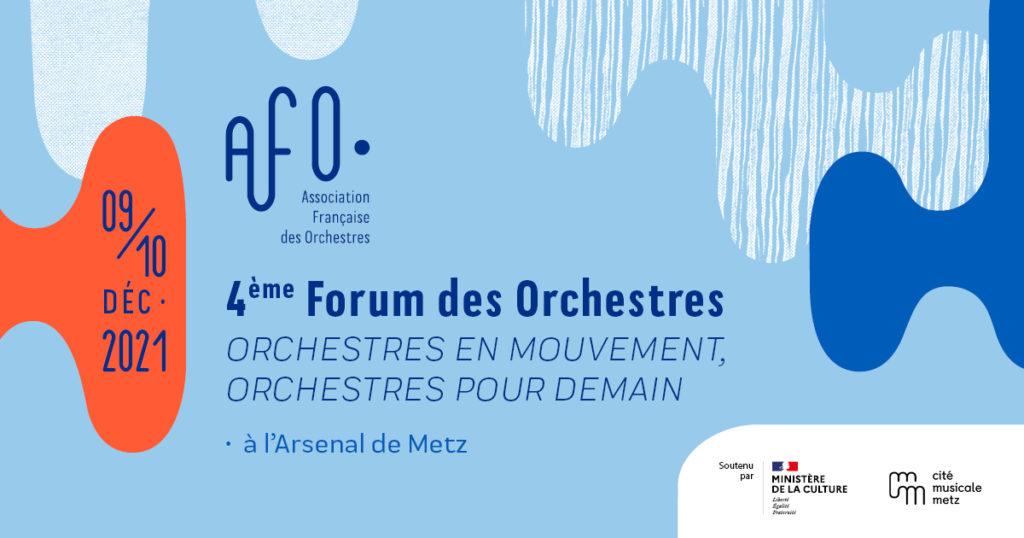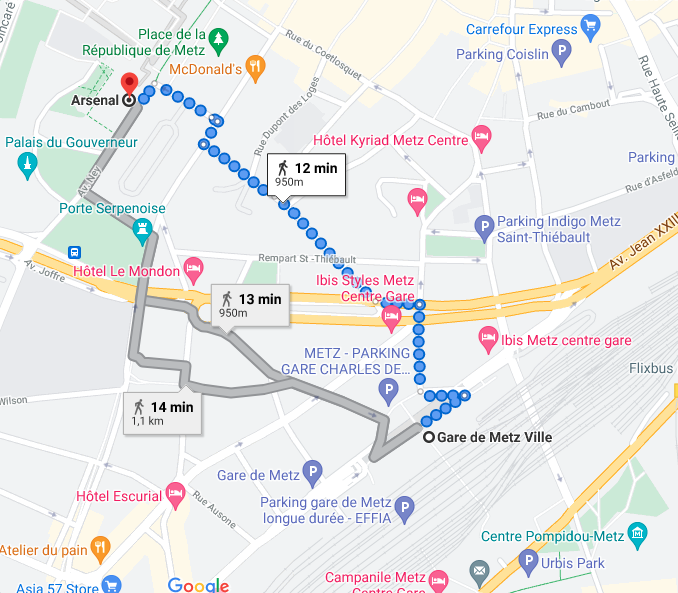The Program

OUR PARTNERS

THE PROGRAMME
THURSDAY 9 DECEMBER 2021
9:30-11:00 am | Welcome
11:00-12:00 | PLENARY 1: Opening speeches
Patrick Thil, President, Cité Musicale-Metz
Catherine Morin-Desailly, President, Association Française des Orchestres / Senator, Seine-Maritime / Regional Councillor, Normandy
Olivier Bianchi, Mayor, Clermont-Ferrand / Co-President, Commission Culture, France Urbaine (video)
David Lisnard, President, Association des Maires de France (video)
Martine Lizola, President, Commission Culture de la Région Grand Est / representative, Régions de France
Christelle Creff, Regional Director of Cultural Affairs, Grand Est
Roselyne Bachelot-Narquin, Minister of Culture (video)
12h-13h30 | Cocktail lunch
13:30-14:50 | PLENARY 2: The permanent orchestra, a model for the future
The orchestra's audience, its missions, its ways of working have changed profoundly during the 20th century. How can we define artistic permanence today and what meaning should we give it in the decades to come?
Dimitri Boutleux, President, Opéra National de Bordeaux
Anne Poursin, expert, Mission orchestres
Pascal Rophé, music director, Orchestre national des Pays de la Loire
Yves Sapir, violin, Orchestre National du Capitole de Toulouse / president, SNAM-CGT
Jérôme Thiébaux, expert, Mission orchestres
Moderated by Saskia De Ville, producer, France Musique
3pm-4:30pm | WORKSHOPS
The permanent orchestra as a resource for the territory (Workshop E1)
How does the orchestra make its artistic strength and cultural expertise available, both inside and outside the orchestra, and encourage multiple partnerships?
Frédérique Boura, Regional Director of Cultural Affairs, Normandy
François Dietsch, Mayor, Val de Briey
Christine Masse-Guépratte, Regional Pedagogical Inspector, Rectorat de l'académie de Strasbourg
Bruno Morel, Managing Director, Emmaüs Solidarité
Anne Poursin, Expert, Mission orchestres
Fabienne Voisin, Managing Director, Orchestre national d'Île-de-France
Moderator: François Bou, General Manager, Orchestre national de Lille
The "augmented missions" of the orchestral musician: what core business in 2021?(Workshop G1)
The permanent orchestra explores an ever-increasing field of activities and develops its artistic proposals around increasingly varied audiences, musical aesthetics and formats. Collective playing, chamber music, audiovisual projects, educational and cultural action: what are the missions of the orchestral musician today?
Jonathan Di Credico, principal bass clarinet, Orchestre national de Metz
Pascal Mangin, City Councillor, Strasbourg
Anselm Rose, Managing Director, Berlin Radio Symphony Orchestra and Choir / Associate Director, Deutscher Orchestertag
Moderator : Anne-Sophie Brandalise, General Manager, Orchestre de Paris
The artistic assets of the permanence (Workshop O1 )
The permanence of the institution and the permanence of the job reinforce the artistic qualities of the orchestras. Thanks to a solid economic model and a meticulous work organisation, they ensure an ever richer artistic offer, guaranteeing the dissemination and evolution of a constantly expanding repertoire.
Jean-Marc Bador, General Delegate, Orchestre philharmonique de Radio France
Christelle Hammache, Viola, Orchestre national de Lille
David Reiland, Musical and Artistic Director, Orchestre national de Metz
Jérôme Thiébaux, Expert, Mission orchestres
Moderator: Saskia De Ville, producer, France Musique
From the multi-annual agreement of objectives to the concerted institutional project: a collective reflection between public partners and stakeholders within the orchestra (Workshop L1)
Institutional mechanisms (national labels, multi-year agreements on objectives) aim to establish convergence between the objectives of public partners. The Pays de la Loire National Orchestra's project in its territory has been rethought thanks to the joint involvement of the State and local authorities, involving the orchestra's administration and representatives of permanent artists. Could this initiative, which is specific to this orchestra for the moment, be extended?
Sophie Bollich, violin, Orchestre national des Pays de la Loire
Antoine Chéreau, vice-president, Conseil régional des Pays de la Loire (video)
Jean-Philippe Marteau, principal English horn, Orchestre national des Pays de la Loire
Laurent Roturier, regional director of cultural affairs, Ile-de-France
Moderator: Aline Sam-Giao, General Manager, Auditorium-Orchestre national de Lyon
16h45 - 17h30 | PLENARY 3: Keynote speaker
Pascal Picq, paleoanthropologist
Interview with Priscille Lafitte, producer, France Musique
20h-23h | Evening at the Centre Pompidou-Metz
Cocktail reception and exhibition tour.
-------------------------------------------------------------------------------------
FRIDAY 10 DECEMBER 2021
9:00-9:30 am | Welcome
9.30-10.30 am | PLENARY 4: The timelessness of the orchestra
Symphonic music continues to fill the public sphere: live concerts, digital broadcasting, radio, cinema, advertising, and more. Everyone shares a personal history with the orchestra's repertoire, whether they are aware of it or not.
François Bou, General Manager, Orchestre national de Lille
Edith Canat de Chizy, composer, member of the Institut de France
Stephan Gehmacher, General Manager, Philharmonie du Luxembourg
XavierZunigo, sociologist, Agence Aristat
Moderator: Christophe Dilys, producer, France Musique
10:40-12:20 | WORKSHOPS
A mosaic public, feedback from the 2013-2019 AFO Aristat audience surveys(Workshop E2)
Carried out in two parts (2013-2014 and 2018-2019), the survey commissioned by the AFO from Aristat shows a plural audience, deconstructing the monolithic representation that is traditionally its own. The presentation of the results of the second part of the survey allows for an unprecedented analysis of the evolution of audiences over the last five years.
XavierZunigo, sociologist, Agence Aristat
Interview with Olivier Schneidjournalist, La Gazette des Communes
The profession of orchestral musician: the modalities of training and professional integration(Workshop G2)
Alongside various partners, how do orchestras participate in the preparation of young artists for the profession of permanent orchestral musician? What tools facilitate the successful integration of young professionals into permanent phalanxes?
Sophie Bollich, violin, Orchestre national des Pays de la Loire
Manus Carey, Deputy principal (performance and programmes), Royal Northern College of Music
Mathieu Ferey, director, CNSMDL
Marie Linden, general manager, Orchestre philharmonique de Strasbourg
Anne Poursin, expert, Mission orchestres
Moderator: Guillaume Hébert, General Manager, Orchestre symphonique de Mulhouse
(Re)creating real musical communities: the links between orchestras, artistic education institutions and amateurs (Atelier O2)
Professional and amateur ensembles coexist in the same area. Many students from conservatories and music schools join these phalanges. How can we consolidate the links that unite them and contribute to nurturing the same desire for an orchestra?
Claire Parruitteviola, Orchestre de chambre de Paris
Anselm RoseManaging Director, Berlin Radio Symphony Orchestra and Chorus / Associate Director, Deutscher Orchestertag
Nicolas StroesserDirector, Conservatoire à rayonnement régional Gabriel Pierné, Eurométropole de Metz
Jérôme Thiébauxexpert, Mission orchestres
Moderator: Christophe Dilys, producer, France Musique
Fulfilment, motivation, health: how to support musicians throughout their career? (Workshop L2)
Musicians' status, employment contracts, continuing education, health and safety at work, retraining: how can the consolidation of human resources management within orchestras meet the needs of organisations, while respecting the individual and collective aspirations of performers?
Delphine Blanc viola, EHESS doctorate
Stephen MaddockChief Executive, City of Birmingham Symphony Orchestra (video)
Frédéric MorandoManaging Director, Orchestre de Pau Pays de Béarn - El Camino
Bérengère Renouoboe and English horn solo, Orchestre de Cannes
Moderator: Claire Roserot de Melin, General Administrator, Théâtre et Orchestre National du Capitole de Toulouse
12:30-14:00 | Cocktail reception
14:00-15:00 | PLENARY 5: Sharing a new narrative for the orchestra
How can we write and share the story of the orchestra of the 21st century, translating the contemporaneity of its missions and the artists who carry them out as well as its availability to all audiences?
Emmanuel Hondré, General Director, Opéra National de Bordeaux Aquitaine
Anne Mistler, Deputy in charge of arts and culture, Strasbourg
Catherine Morin-Desailly, President, Association Française des Orchestres / Senator for Seine-Maritime / Regional Councillor for Normandy
Moderator: Christophe Dilys, producer, France Musique
15:10-16:50 | WORKSHOPS
Putting an end to the hierarchy of audiences: the implementation of cultural rights(Workshop E3)
The 2016 LCAP law enshrines the respect for cultural rights that orchestras implement on a daily basis, addressing increasingly varied audiences and thanks to constantly renewed artistic proposals. However, the paying concert listener still seems to be the only one we are interested in by evaluating his attendance and behaviour. How can we better display the plurality of the actions carried out and their effects on audiences that might be thought to be neglected?
Nicolas Droin, General Director, Orchestre de chambre de Paris
Dominique Muller, Music Delegate, DGCA - Ministère de la Culture
Ferdinand Richard, Founder and Executive Director, Fanak Fund for Artist Mobility between Europe, the Arab World and the Middle East
Moderator: Loïc Lachenal, Director, Opéra de Rouen Normandie
The sustainable orchestra, adapting its practices today(Workshop G3)
We are all confronted with the challenges of the ecological crisis and are united in the search for solutions. Reflection is underway and the debate is open with all stakeholders to lead to concrete actions.
Louise Lapierre, bassoon, Collectif Verdi
Sylvie Robert, Senator of Ille-et-Vilaine
Anaïs Roesch, Project Manager - Culture, Climate and Energy Sector, The Shift Project
Moderator: Clémence Quesnel, Assistant Director, Association Française des Orchestres
Equality, diversity: an orchestra that reflects contemporary societies?(Workshop L3)
Diversity characterizes the orchestra's artistic proposals and the audiences it addresses. At a time when orchestras are working hard on issues of gender equality and diversity, how does contemporary society recognize itself in the ranks of permanent musicians?
Florence Alibert, General Manager, Cité Musicale-Metz / member of the Permanent Equality Commission, AFO and Forces Musicales
Reguina Hatzipetrou-Andronikou, sociologist, post-doctoral fellow at OFCE, Sciences Po Paris.
Bianca Maretti, doctoral student in music and musicology, Sorbonne University
Jérôme Thiébaux, associate professor, musicologist
Moderator: Philippe Fanjas, Director, Association Française des Orchestres
17:00-17:20 | PLENARY 6: What orchestra in 2030?
Catherine Morin-Desailly, President of the Association Française des Orchestres / Senator for Seine-Maritime / Regional Councillor for Normandy
20:00 | Concert: The Slavic soul - Orchestre national de Metz, Diana Tishchenko
Distribution
Conductor: Lionel Bringuier
Violin: Diana Tishchenko
Programme
Bedřich Smetana - The Moldau
Pyotr Ilyich Tchaikovsky - Violin Concerto
Zoltán Kodály - Galanta Dances
Pyotr Ilyich Tchaikovsky - Francesca Da Rimini
Venue: Arsenal - Great Hall
Duration: 1h30 + intermission
Program subject to change.
PRACTICAL INFORMATION
Health protocol
In accordance with government measures, we inform you that presentation of the health pass, in digital or paper version, is compulsory for access to all sites where the Forum takes place (Arsenal, Centre Pompidou Metz).
Upon arrival at one of our sites, you will be required to attest to one of the following three proofs:
- a complete vaccination program
7 days after the 2nd injection for double-injection vaccines (Pfizer, Moderna, AstraZeneca) ;
28 days after injection for single-injection vaccines (Johnson & Johnson);
7 days after injection for vaccines in people with a history of Covid (single injection).
- a negative PCR or antigen test less than 24 hours old
- the result of a positive PCR or antigen test attesting to the recovery of Covid-19, more than 11 days and less than six months old
Anyone failing to present a valid health pass will be refused access to the forum. No refunds will be given.
Masks must be worn by all staff, participants and attendants. Hydro-alcoholic gel is available.
Our venues comply with strict sanitary protocols, with cleaning and disinfection of rooms, reception areas and sanitary facilities. Rooms are regularly ventilated and gauges are adapted:
- The Esplanade room, where the plenary sessions will be held, has a capacity of 350 seats for 150 participants.
- The workshop rooms have a capacity of 100 people, with an average of 35 participants.
- As far as catering is concerned, the protocols allow the masks to be removed for the duration of the meal. The room in which the cocktails will take place has a capacity of 600 people, enabling distances of 2 meters between each guest to be respected.
Please follow all these instructions, wash your hands regularly and stay at home if you have any Covid-19-related symptoms.
Accommodation
The partner hotels of the Cité Musicale-Metz offer preferential rates to participants of the event. As places are limited, we advise you to book your accommodation as soon as possible!
To benefit from the preferential rate, don't forget to specify that you are taking part in a Cité Musicale - Metz event.
Getting there
Arsenal - 3 Avenue Ney - 57000 Metz
